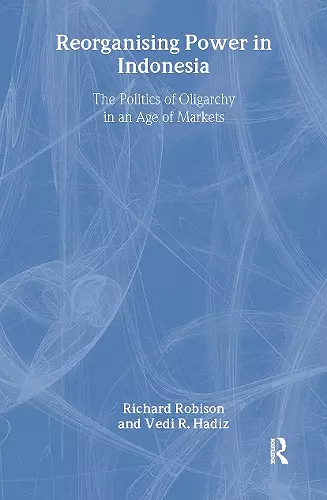Reorganising Power in Indonesia
The Politics of Oligarchy in an Age of Markets
Richard Robison author Vedi Hadiz author
Format:Hardback
Publisher:Taylor & Francis Ltd
Published:5th Feb '04
Currently unavailable, our supplier has not provided us a restock date
This hardback is available in another edition too:
- Paperback£71.99(9780415332538)

Reorganising Power in Indonesia is a new and distinctive analysis of the dramatic fall of Soeharto, the last of the great Cold War capitalist dictators, and of the struggles that reshape power and wealth in Indonesia. The dramatic events of the past two decades are understood essentially in terms of the rise of a complex politico-business oligarchy and the ongoing reorganisation of its power through successive crises, colonising and expropriating new political and market institutions. With the collapse of authoritarian rule, the authors propose that the way was left open for this oligarchy to reconstitute its power within society and the institutions of newly democratic Indonesia.
'[This] is the first study to spell out the nature of the relationship between a national oligarchy and the global market place. As such it is not only an important empirical study, it also represents a major critique of the neo-classical understanding of development that prevailed throughout the late 20th century.'
- Richard Higgott, The Pacific Review
'Richard Robison and Vedi Hadiz have delivered the most comprehensive and analytically sound book on the politics of post-New Order Indonesia written so far.'-The Jakarta Post
'In this information-packed and theoretically sophisticated analysis, Robison and Hadiz brilliantly argue that, in spite of Indonesia's economic successes and the collapse of Suharto's regime, power arrangements in the country still operate to keep an oligarchy in command.' - Lucien W. Pye, Foreign Affairs
'This is a superb book that should remain the definitive account of Indonesia's political-economic elite during the years preceeding and following the New Order's collapse. The book gives us a clearly stated benchmark against which to mark the progress of meaningful reform. Well worth the read.' - Pacific Affairs
'In this exciting book, two well-known scholars of Indonesian political economy address questions about the nature of institutional change and the prospects for neoliberal convergence toward democracy and free markets. In the process, they provide one of the most novel, detailed, coherent, and analytically grounded accounts of Indonesian politics in recent years...by shifting the analytic focus away from well-worn political actors and cleavages, this book gives a remarkably fresh account of the New Order, and brings forward many figures and conflicts that had previously been obscured...the authors have provided a book that uses a single analytic framework to rethink the New Order, to provide a promising interpretation of the democratic era, and to link politics past and present in a tightly coherent and highly detailed narrative...It will continue to do what good books do--generate debate and new lines of research--and will significantly advance our understanding of Indonesian politcs.' -Indonesia, 82 (October 2006)
'Richard Robison and Vedi Hadiz have delivered the most comprehensive and analytically sound book on the politics of post-New Order Indonesia written so far.'-The Jakarta Post
'In this information-packed and theoretically sophisticated analysis, Robison and Hadiz brilliantly argue that, in spite of Indonesia's economic successes and the collapse of Suharto's regime, power arrangements in the country still operate to keep an oligarchy in command.' - Lucien W. Pye, Foreign Affairs
'[This] is the first study to spell out the nature of the relationship between a national oligarchy and the global market place. As such it is not only an important empirical study, it also represents a major critique of the neo-classical understanding of development that prevailed throughout the late 20th century.' - Richard Higgott, Editor, The Pacific Review
'Russia and the other transition economies have taught us that policy change involves a struggle over assets and that market-oriented reform can be hijacked to sustain, or even generate, new structures of power and corruption. In this powerful and historically rich book, Robison and Hadiz make the same point for the Indonesian oligarchy, showing its tremendous resilience in the face of a variety of external and internal pressures, from the IMF to the democratic opposition.' - Stephan Haggard, University of California San Diego, USA
'Vedi Hadiz and Richard Robison argue that what is taking place in Indonesia is the reorganization of the power relations incubated within the Soeharto regime rather than their fundamental transformation, and that democratizing was instituted for the survival of the interests nurtured under Soeharto's rule as the institutional structures of the New Order became unviable. A must read for anyone interested in Indonesia and "Third World" transformations.' - Takashi Shiraishi, Kyoto University, Japan
'The authors have provided a book that uses a single analytic framework to rethink the New Order [...] in a tightly coherent and highly detailed narrative. Not surprisingly, this book has already become required reading for those interested in Indonesian politics. It will continue to do what good books do—generate debate and new lines of research—and will significantly advance our understanding of Indonesian politics.' - Erick M. Danzer, Indonesia 82 (October 2006)
ISBN: 9780415332521
Dimensions: unknown
Weight: 635g
322 pages